2001 Toyota Sequoia Service, Tires & Repairs
Get Started
Complete Auto Care for Your 2001 Toyota Sequoia
-
TIRES FOR YOUR 2001 Toyota Sequoia View Tire Info GET TIRE PRICING
-
REPAIR FOR YOUR 2001 Toyota Sequoia View Repair Info SCHEDULE REPAIR
-
MAINTENANCE FOR YOUR 2001 Toyota Sequoia View Maintenance Info SCHEDULE MAINTENANCE
-
OFFERS FOR YOUR 2001 Toyota Sequoia Limited Time Tire Offers VIEW ALL COUPONS
2001 Toyota Sequoia Tires
Recommended Tires | Tire Information
2001 Toyota Sequoia Tires Sizes, Speed Ratings, and Inflation
Not sure about your 2001 Toyota Sequoia tire size? Use the following chart to find information on tire size, speed rating, and inflation.
| Trim Level | Speed Rating | Inflation in PSI F/R | Tire Size |
|---|---|---|---|
| 2001 Toyota Sequoia Limited | S | 32 PSI/32 PSI | P265/70R16 |
| 2001 Toyota Sequoia SR5* | S | 32 PSI/32 PSI | P265/70R16 |
| 2001 Toyota Sequoia SR5* | S | 32 PSI/32 PSI | P265/70R16 |
| 2001 Toyota Sequoia SR5* | S | 32 PSI/35 PSI | P245/70R16 |
|
2001 Toyota Sequoia Limited Speed Rating: S Inflation F/R: 32 PSI/32 PSI |
|
2001 Toyota Sequoia SR5* Speed Rating: S Inflation F/R: 32 PSI/32 PSI |
|
2001 Toyota Sequoia SR5* Speed Rating: S Inflation F/R: 32 PSI/32 PSI |
|
2001 Toyota Sequoia SR5* Speed Rating: S Inflation F/R: 32 PSI/35 PSI |
* Note: these models have different tire sizes depending on vehicle options.
Recommended Tires for Your 2001 Toyota Sequoia
What tires are best for a 2001 Toyota Sequoia? Check out the following tire brands and types.
 Blizzak DM-V2
Blizzak DM-V2
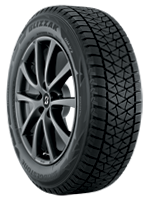
- No warranty
- Winter
- Winter
 ALENZA AS ULTRA
ALENZA AS ULTRA
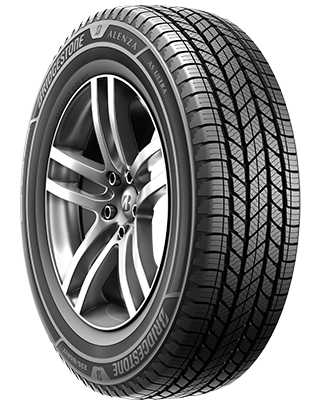
- No warranty
- All-Season
- Light Truck Tires
 Dueler A/T Revo 3
Dueler A/T Revo 3
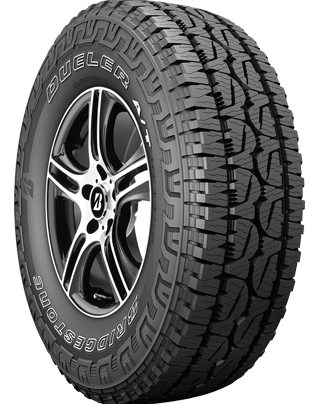
- Platinum Pact Limited Warranty
- All-Season
- Light Truck Tires
 Destination A/T2
Destination A/T2
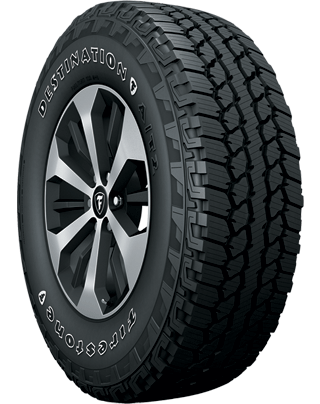
- Gold Pledge Limited Warranty
- All-Season
- Light Truck Tires
 Destination LE3
Destination LE3
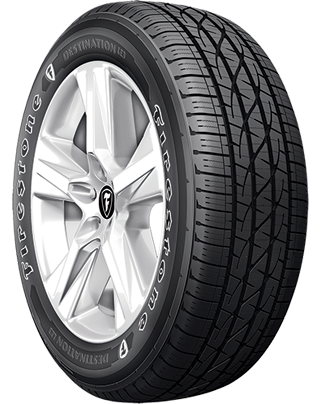
- No warranty
- All-Season
- Light Truck Tires
 Winterforce 2 UV
Winterforce 2 UV
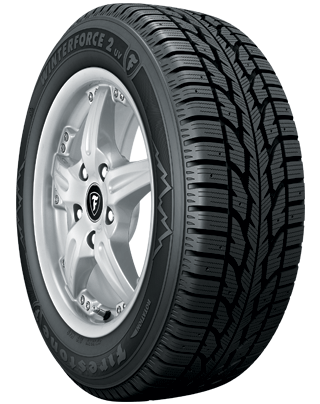
- No warranty
- Winter
- Winter
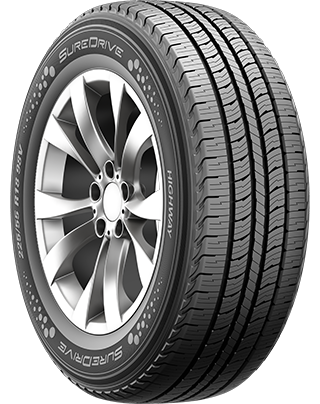
- No warranty
- All-Season
- Light Truck Tires
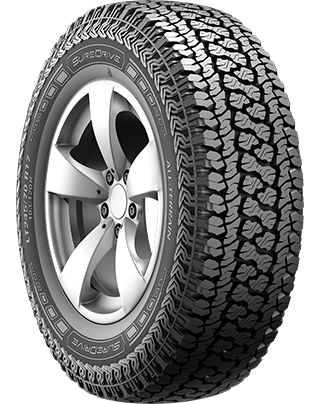
- No warranty
- All-Season
- Light Truck Tires
 OPEN COUNTRY A/T III
OPEN COUNTRY A/T III
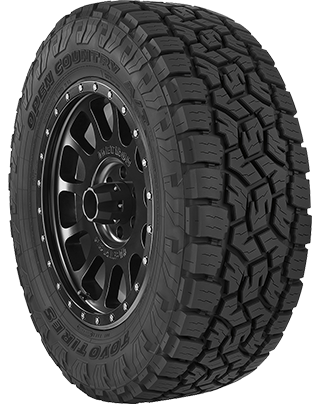
- No warranty
- All-Season
- Light Truck Tires
 OPEN COUNTRY HTII
OPEN COUNTRY HTII
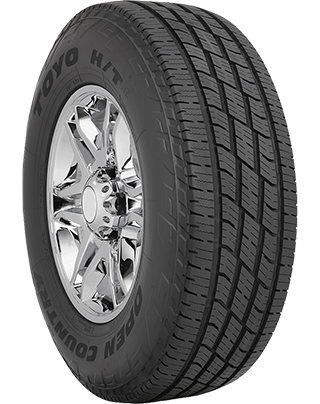
- No warranty
- All-Season
- Light Truck Tires
Choosing 2001 Toyota Sequoia Tires
Beyond the correct tire size, there are a couple of other factors to consider when buying Toyota Sequoia tires like how and where you drive, and how much you want to spend. When evaluating your driving conditions, think about where you live (countryside vs. city vs. mountains) and the kind of unexpected weather you're likely to experience. It's not uncommon for drivers in states that experience all four seasons to buy more than one set of tires. one for winter and one for summer. Other drivers prefer the convenience of all-season tires. They make one trip to the tire shop and they're pretty much ready for rain, light snow, or sun!
Your personal driving style is the next factor to consider. If you're a big off-roading fan who forges paths where others can't, you have very different needs than a long-distance commuter who sticks to the highway. Talk to a tire technician at Firestone Complete Auto Care for help choosing the best tire for you, or start shopping for Toyota Sequoia tires online.
Installing Toyota Sequoia Tires
Firestone Complete Auto Care installs more tires on more cars than most other companies. We're your one-stop shop for tire installation, rotation, and ongoing maintenance! Buy 2001 Toyota Sequoia tires online and schedule your installation when it's convenient for you.
Questions About 2001 Toyota Sequoia Tires
-
Why does Toyota tire inflation matter? Even a tiny decrease in tire pressure could impact your safety and fuel economy. Maintaining proper tire pressure can help increase fuel economy, improve braking time, and boost tire lifespan.
-
Why are there numbers on the side of my Toyota Sequoia tires? Your tire sidewall numbers tell you the recommended load carrying capacity, speed rating, treadwear, traction, and tire size. Talk to a tire technician to learn how to read Toyota tire numbers.
-
How do I check the tread depth on my Toyota tires? Stay on top of your tire tread depth to help avoid a dangerous drive. You can check tread depth with a penny. Hold the penny so that Abraham Lincoln is facing you, then place your penny into a tread groove upside down. If you can see the top of Abe’s head, your tread is shallow and it might be time for new Toyota Sequoia tires. Grab a penny. Hold the so that Abe Lincon's head is facing you and his hair is pointing toward the ground. Then, place the penny into a tread groove. If you can see the top of Abe’s head, your tread is shallow and it might be time for new Toyota Sequoia tires.
Repair Services for Your 2001 Toyota Sequoia
Want more details? Choose a service below to read more about Toyota Sequoia repairs at Firestone Complete Auto Care.
2001 Toyota Sequoia Repair Information
Car repairs: for many drivers, that phrase is a dreadful one. But we work to provide you with a different experience at Firestone Complete Auto Care. When you come to us for 2001 Toyota Sequoia repair services, rest easy knowing that your Sequoia is in capable hands. We'll work to evaluate the scope of repairs needed and explain your options. If a repair isn't necessary, we won't recommend it.
How Much Does Toyota Sequoia Repair Cost?
Several factors can affect the cost to repair your 2001 Toyota Sequoia, including which repairs are needed, the cost of any replacement parts, how much labor the repair will take, and where you live. They're updated regularly!
A few different aspects can influence repair costs for your 2001 Toyota Sequoia, like
2001 Toyota Sequoia Auto Repair Q&A
-
Do I need to follow Toyota's maintenance schedule? Don’t neglect scheduled maintenance. Sure, you could skip out on a few recommended maintenance services, but you may pay the price later. Bring your vehicle to Firestone Complete Auto Care at recommended service intervals to address minor issues before they get out of hand and keep your car running newer, longer.
-
What's wrong if something feels 'off' in my Toyota? No, we’re not talking about finding the best jams on the radio! You know your car best, and you’re the first person who will notice if something doesn’t feel right (like new smells, sights, or sounds coming from your car). If you sense that something is 'off,' stop in for a Courtesy Check to have these symptoms checked out ASAP. Early action could help you prevent Toyota Sequoia repairs.
-
Do I have to get the repairs you recommend for my Toyota? Talk to your technician. We'll never recommend a service or repair for your 2001 Toyota Sequoia that we don't think is necessary for your safety.
Get Your 2001 Toyota Sequoia Brakes Fixed
Your Toyota Sequoia may be powered by a strong engine. But if you can’t stop it, it’s as good as scrap metal. Don't wait if you're experiencing brake squeaks or a loss of braking power. Safe driving and responsive brakes go hand in hand. What's more, waiting for things to figure themselves out can result in more damage to your brakes and your wallet. Visit Firestone Complete Auto Care for the right brake repair for your 2001 Toyota Sequoia. Our brake repair services include pad/shoe replacement, brake rotor/drum resurfacing, brake fluid exchange, and brake caliper and wheel cylinder service.
Questions About Your Toyota Sequoia Brakes
-
Why is my Sequoia shaking as I brake? Feeling shaking or vibrating in your Sequoia as you brake might indicate a few different problems, including worn brake pads or rotors, loose suspension components, damaged brake calipers, or warped rotors. Book an appointment for a free brake inspection as soon as you notice a problem with your brakes.
-
What is the average lifespan of Sequoia brake pads? In general, brake pads can last from 30,000 to 40,000 miles. Certain factors, like driving on highways mostly and braking smoothly, can help your brake pads last longer. Hauling heavy loads and riding your brakes can shorten brake pad lifespan.
-
Can brake fluid leak when my Sequoia is off? Your Sequoia brake system is a closed hydraulic system, so a brake fluid leak likely means you have an issue in your brake system. Over time, brake components can wear out or get damaged, causing a brake fluid leak.
When to Get Toyota Sequoia Drivetrain Repairs
Drivetrains for front, rear, and all-wheel-drive and 4WD vehicles are quite different, so you don't want to go to just anyone for drivetrain repair. You want to come see the technicians at Firestone Complete Auto Care. We can take care of most 2001 Toyota Sequoia drivetrain components Your Sequoia might need driveshaft repair if you notice vibration as your vehicle accelerates, clunks when shifting, heavy vibrations in your floorboards, or resistance when turning.
2001 Toyota Sequoia Drivetrain Questions
-
How do I know if my Toyota drivetrain is damaged? Your Toyota Sequoia drivetrain might be damaged if you notice strange noises from the rear of your vehicle, see fluid leaking, or have issues turning.
-
Why is my Sequoia malfunction indicator light (MIL) on? Engine problems, transmission problems, faulty sensors, electrical issues, misfire issues, and connector problems could all cause your Sequoia’s malfunction warning light, or better known as the check engine light, to illuminate.
-
How concerning is a drivetrain malfunction in my Sequoia? Don't ignore a drivetrain malfunction in your Sequoia. As soon as you notice a problem, have it checked by a professional mechanic to diagnose the issue and carry out any necessary repairs. Driving with a faulty drivetrain is risky and may further damage your Sequoia.
Wheel Alignment for 2001 Toyota Sequoia
Alignment services involve precise adjustments to your Toyota Sequoia’s suspension system, which serves to attach your wheels to your vehicle. In an alignment service, calculated changes are made to the angles of your tires. This is so that your tires hit the road at an optimal angle for your vehicle’s performance — just as Toyota intended. Before we adjust the alignment of your 2001 Toyota Sequoia, we’ll start by checking the current alignment angles. After that, we can adjust your wheel alignment angles until they match Toyota’s recommended measurements.
Answers to Toyota Sequoia Alignment Questions
-
Are there road conditions that can hurt my Toyota Sequoia alignment? Hitting a pothole or curb can alter your wheel alignment. So can general wear and tear over time.
-
How frequently should you get a wheel alignment for your Sequoia? It’s usually suggested you check your alignment about every 6,000 miles or 6 months (whichever occurs first). Still, you should reference your Sequoia owner’s manual for Toyota's recommended interval.
-
Do you need an alignment with new Sequoia tires? It’s not mandatory to get an alignment after installing new tires on your Sequoia, but it can be a smart decision! Proper alignment from the jump can help improve handling, fuel efficiency, and tire wear.
Engine Repairs for Your 2001 Toyota Sequoia
When your Toyota Sequoia engine needs repairs, our expert techs will let you know what needs to be done and why before they get started. We never do any work without your sign-off. If a service can wait, we’ll make sure you know. If it's necessary for your safety, we'll make sure you understand that, too. We want to provide you with the information you need to make an informed engine repair decision. By choosing Firestone Complete Auto Care for Sequoia engine repairs and you can drive easy knowing that we use Toyota-approved parts and fluids — timing belt, oil gasket, ignition coil, or a different component.
Engine Q&A 2001 Toyota Sequoia
-
Why does the check engine light come on when I start my Sequoia? It’s usually normal for your check engine light to turn on upon ignition. This is just your Sequoia testing its circuits. The dash light shouldn't stay on. If it does, you might want to bring your vehicle in for service.
-
Why is my Toyota Sequoia making engine noise? Strange engine sounds can be a sign something’s off in your Toyota Sequoia. Knocking or tapping could be a symptom of low oil. A high-pitched whistle could signal an intake leak or misaligned belt. Squealing can be traced back to a loose fan belt, and grinding might be a sign of brake problems rather than engine issues.
-
Are you unknowingly damaging your Toyota Sequoia engine? Certain driving habits can damage your engine and should be avoided. These habits include 'running on fumes,' revving the engine while still in Park, or pushing 'the pedal to the metal' before the engine has warmed up. Help sustain your engine’s performance and efficiency by staying miles away from these bad driving practices.
Get Your Toyota Sequoia Tire Repaired
If the road has been rough on your 2001 Toyota Sequoia tires, Firestone Complete Auto Care can help. There’s a chance your tire could be plugged and patched (rather than replaced). Our technicians can inspect your tire and let you know if it is safe to repair. We’ll begin by taking a look at where the damage is, the type and extent of the tire damage, and how all of your tires are wearing.
If we determine that your 2001 Toyota Sequoia tire can be safely repaired, we'll follow three basic steps to repair it: (1) Take the tire off the wheel for easy inspection, (2) fill the puncture to keep the moisture out, and (3) seal the inner liner with a repair unit to prevent air loss.
Toyota Sequoia Tire Repair Questions
-
Can I drive my Toyota on a flat tire? Driving on a flat or underinflated tire can put extra stress on your wheels and alignment. While it’s sometimes necessary to drive a short distance on a flat tire to get to a safe place, don’t take any other trips in your Sequoia until you can have the flat tire repaired or replaced.
-
Is temporary sealant bad for my Toyota's tires? Fast fixes are a mixed blessing. They’ll help you get your Toyota Sequoia to Firestone Complete Auto Care, but don’t count on them to keep you on the road for very long. Using a temporary sealant may also void a Bridgestone or Firestone tire warranty.
-
Why do the tires on my Sequoia keep losing air? Possible reasons for your Sequoia tires continuously losing air include a leaking valve steam, wheel damage, and a puncture or hole in the rubber.
2001 Toyota Sequoia Maintenance
When it comes to your Toyota Sequoia, how you treat your car makes all the difference in its performance. With proactive maintenance, your Sequoia could be on the road well past the 200,000 mile mark.
Guide to 2001 Toyota Sequoia Scheduled Maintenance
There's no need to guess when it's time to get Sequoia maintenance, and no need to wait until something goes wrong. Rely on the recommended maintenance schedule that’s been created just for your 2001 Toyota Sequoia! This recommended maintenance schedule is written by the auto manufacturer, Toyota themselves. Driving conditions, climate variations, and other variables can affect which scheduled maintenance services you’ll need; however, there’s a good chance that your vehicle’s recommended maintenance services will include tire rotations, vital fluid checks/exchanges, filter changes, brake pad replacement, and oil changes. Scheduling routine service appointments is one of the best ways to help extend your Sequoia's life, keep you safer on the road, and prevent common 2001 Toyota Sequoia problems.
Essential Maintenance to Keep Your 2001 Toyota Sequoia Running Newer, Longer
Bring your 2001 Toyota Sequoia to Firestone Complete Auto Care for factory-recommended maintenance services and an expert technician will begin by performing a Courtesy Check. This Courtesy Check can establish a baseline of what may need to be addressed during your service appointment. During a Courtesy Check, we’ll always check your battery, then we’ll move on to inspect your Sequoia’s head and tail lights, tires, fluid levels, alignment, and windshield wipers.
Firestone Complete Auto Care is your spot for 2001 Toyota Sequoia maintenance. We can help you keep your vehicle (and your life!) running smoothly. Many of our locations have weekend and evening hours for your convenience.
Questions About 2001 Toyota Sequoia Maintenance
-
What should I do after hitting a pothole in my Toyota Sequoia? You know your Toyota Sequoia better than anyone else, so you’ll know if something doesn’t feel right while driving. Have your alignment checked (and adjusted if necessary) as soon as you notice a pulling steering wheel to prevent suspension damage or uneven tire wear.
-
When should I use high mileage oil in my Toyota Sequoia? If your Toyota Sequoia has ticked past 75,000 miles, consider switching to high mileage oil at your next oil change to give your engine what it needs to go another 75,000 (or more!). High mileage oil: make it a high priority!
-
Can I ignore dashboard lights on my Toyota? It's better to get them addressed as soon as possible. An illuminated dashboard light means something in your vehicle isn't functioning like it should. Letting problems linger can mean bad news for your Toyota Sequoia, so be sure to take your car in for service as soon as you notice an illuminated dashboard light.
Battery Size & Replacement for 2001 Toyota Sequoia
Not sure what battery to get for your Toyota Sequoia?
| Battery | Engine | Warranty | Cold Cranking Amps | |
|---|---|---|---|---|
| 24F-3 | V8/4.7L | Replacement 24 months | Performance months | 650 |
| 35-2 | V8/4.7L | Replacement 36 months | Performance months | 640 |
| 24F-RP | V8/4.7L | Replacement 48 months | Performance months | 750 |
2001 Toyota Sequoia Batteries
On average, auto batteries last anywhere from three to five years. Check your battery regularly and replace it as needed so it doesn’t leave you and your Toyota Sequoia stranded. Watch for signs that your current battery is getting too old or too weak. A lagging starter, an illuminated check engine light or battery signal, bloated battery case, corroded battery terminals, or dim headlights can all signal that your battery is on its last leg.
Or, you can get a complimentary battery check at your nearest Firestone Complete Auto Care. Visit us for a complimentary battery check and, if needed, a replacement battery for your 2001 Toyota Sequoia. Car batteries are one of our many specialties! Our technicians are well-acquainted with Toyota’s service specs for Sequoia car batteries’ reserve capacities and cold cranking amps. Get help identifying the type and size of battery that's best for your Sequoia, and schedule a weekday or weekend battery replacement service for your car.
Top Toyota SequoiaCar Battery Questions
-
Why doesn’t my Toyota Sequoia battery stay charged? A battery that won't hold a charge is almost as good as dead. The battery might be old. Or, you may have a habit of leaving your car doors open and the lights on overnight. Stop by for a free battery test at your local Firestone Complete Auto Care to learn more about the state of your battery.
-
How long do car batteries last? The typical 12-volt car battery may last three to five years, depending on the type of battery, the driving conditions, and how well the battery is maintained.
-
Why is there white, flaky stuff around my Sequoia’s battery post? If you notice white, crusty stuff around the battery terminals of your Sequoia, it's likely corrosion. A chemical reaction between battery acid and the air can create a white, powdery substance that builds up over time on the terminals. This buildup can interfere with the electrical connection between the battery and your Sequoia’s electrical system, potentially leading to poor performance, difficulty starting, and other issues.
Oil Changes for 2001 Toyota Sequoia
Toyota recommends having your 2001 Toyota Sequoia’s motor oil changed at regular intervals. Your Sequoia may need an oil change right away if your check engine/oil change light is on, you hear knocking sounds coming from the engine, smell oil inside the car, or notice excess vehicle exhaust. You may also need an oil change more frequently than Toyota recommends if you haul heavy loads, frequent dusty roads, enjoy off-roading, or drive at low speeds for long distances.
Your local Firestone Complete Auto Care has the right 2001 Toyota Sequoia motor oil: either synthetic or conventional. Check your owner's manual and talk with a technician to select the right Toyota Sequoia oil, whether it's Quaker State® Advanced Durability™ conventional oil, Pennzoil® High Mileage Vehicle® motor oil, Pennzoil Platinum® Full Synthetic motor oil with PurePlus™ Technology, or Shell Rotella® heavy-duty engine oil. During your oil change service, an auto technician will change your Sequoia’s oil, replace and recycle the old oil and filter, inspect all of your other filters, top-off essential fluids, and perform a courtesy inspection on your entire vehicle. Get professional engine care by making an oil change appointment for your Sequoia today.
2001 Toyota Sequoia Oil Change Q&A
-
What can cause the oil light on my Toyota Sequoia to illuminate? If you’re overdue for an oil change, it might trigger your Toyota Sequoia oil change reminder light. If the oil pressure light is illuminated, it could be due to low engine oil, a failing oil pump, a malfunctioning oil pressure sensor, or a clogged oil filter.
-
How hard is it to change Toyota Sequoia oil at home? Changing engine oil at home isn’t as simple as it’s made out to be. You’ll have to figure out how to properly dispose of the oil and buy special tools. Having your oil changed professionally can not only reduce the risk of something going wrong during the service, but it’ll also help your car perform smoothly down the road.
-
Why is my Toyota Sequoia exhaust smoke grayish or blue? You could have an oil leak and have a case of burning oil. Looks like it’s time for a professional to take a look. The leak could be the result of worn valve seals, fried piston rings, or old cylinder walls.
2001 Toyota Sequoia Engine Tune-Ups & Maintenance
Routine engine tune-ups can bring power back to your Sequoia. Your local Firestone Complete Auto Care offers a range of engine tune-up services for your 2001 Toyota Sequoia. One option is the standard Firestone Tune-Up. It includes a complete visual inspection of engine components, installation of new spark plugs, and a lifetime warranty on parts*. Another service option pays special attention to the filters in your Sequoia. Specifically, we replace the fuel filter and air filter. Our third service is a thorough cleaning of the fuel system. During this type of tune-up, we use a three-step process to get rid of harmful varnish, dirt, and carbon deposit buildup in your Sequoia’s fuel injectors, throttle body, and throttle plate. This goes a long way in boosting your fuel system’s overall performance. Consider this when choosing a tune-up service for your Sequoia: your vehicle’s maintenance record and mileage can determine which service is best. Talk to a technician about your driving style, mileage, and service history to learn more about your vehicle's specific needs.
*Check with a teammate at Firestone Complete Auto Care for complete terms and conditions regarding warranties.
2001 Toyota Sequoia Engine Tune-Up Q&A
-
Will it hurt my Toyota Sequoia to drive with old spark plugs? Replace spark plugs on time or about every 30,000 miles or so. Spark plugs are small but mighty. The spark of electricity that the plug emits across a small gap creates the ignition for the combustion needed to start your car. Without that spark, your car won't start.
-
What do I do if I see a pool of liquid under my Toyota Sequoia? Puddles could indicate that your vehicle is leaking coolant, oil, or brake fluid. Ignoring these leaks can lead to permanent engine damage, so address these symptoms ASAP with a tune-up service.
-
How frequently do the fuel injectors in my Toyota Sequoia need to be cleaned? The cleaning schedule for vehicle fuel injectors varies depending on your driving conditions and the type of fuel you use. Some manufacturers suggest cleaning your fuel system as part of routine maintenance, while others will recommend it on an as-needed basis if you’re experiencing poor performance. Reference your Toyota owner’s manual for exact guidelines.
2001 Toyota Sequoia Suspension Service & Repair
When you first bought your 2001 Toyota Sequoia, the ride was probably so smooth that you didn’t even think about it! But these days, things are starting to feel a bit rough. Maybe your Sequoia jolts, sways to one side, or makes a weird sound when you drive over a speed bump or turn. The first sign of trouble is the best time to bring your 2001 Toyota Sequoia in for steering and suspension services. We'll get to the root of the problem and, if your car needs steering and suspension repairs, we'll explain all of your options and the potential cost.
2001 Sequoia Steering & Suspension Q&A
-
Why does my Toyota Sequoia bounce so much? Damaged struts or shocks can't dampen road bumps properly, causing your vehicle to feel like a trampoline after each dip or bump.
-
Why does my Sequoia's nose dive down when I hit the brakes? The forward dip in the front end of your Sequoia when you brake is caused by the weight and momentum transferring to the front wheels. If your suspension system is in bad shape, it can fail to distribute this force, leading your front end to dip further downward.
-
Does treadwear and tire pressure impact my Sequoia's steering and suspension? Proper tire care can reduce strain on the suspension system, and also alert you to the need for new tires. Uneven tire wear is one sign of steering and suspension system problems, but it can also contribute to more.
A/C Service for Your 2001 Toyota Sequoia
Our technicians will work to solve your 2001 Toyota Sequoia A/C problems to the best of their ability. During an A/C performance check, we'll determine the condition of your 2001 Toyota Sequoia A/C system to determine whether repair work is needed. This check will include an examination of system pressure, a visual inspection, and a leak test.
While your 2001 Toyota Sequoia’s air conditioner is being serviced, we’ll also do an A/C evacuation and recharge. To start this process, a technician will flush out the old refrigerant from your vehicle’s A/C system. Next, they will evacuate the system according to Toyota's recommendations. The A/C system is recharged with new refrigerant.
Questions About 2001 Toyota Sequoia A/C Systems
-
Why do I get hot air from my Sequoia A/C? Maybe your A/C starts cool but then gets warm. Or maybe it never gets cold in the first place. Either way, your A/C troubles could be traced back to a clogged expansion valve, faulty compressor clutch, blown fuse, or leak.
-
What can cause an A/C system leak? Over the years, the rubber seals and gaskets in your Sequoia’s A/C system naturally degrade. Moisture can get into the system and cause a malfunction, or parts can simply wear out so that your system no longer seals properly.
-
Why does my vehicle have to be moving for my Sequoia’s A/C to work? Damaged or worn components in your Sequoia’s electrical or air conditioning system can cause the A/C to only work when the car is moving. You may be dealing with low coolant or a faulty cooling fan.
2001 Toyota Sequoia Transmission Service & Repairs
The transmission delivers power from the motor to your wheels so that you can drive at your desired speed. Because your transmission is responsible for converting the right amount of power into the right amount of speed, even the smallest transmission problems should be addressed right away. 2001 Toyota Sequoia transmission problems can show up as shifting delays, jumping or grinding during acceleration, the car shaking on the road, or a burning smell or whistling sounds coming from under the hood. If you ignore Toyota Sequoia transmission issues your could suffer a loss in fuel efficiency or find that your Sequoia isn’t working at all. Our expert techs are familiar with 2001 Sequoia services and perform them according to Toyota-recommended specifications. Schedule an appointment at your local Firestone Complete Auto Care at the first sign of transmission problems to help keep your Toyota running for miles and miles.
2001 Toyota Sequoia Transmission Q&A
-
When should I have my Sequoia's transmission fluid checked or exchanged? Caring for your Toyota Sequoia’s transmission fluid is a great way to help it perform. About every 30,000 to 60,000 miles is a good timeframe for having your transmission fluid inspected and perhaps changed. Service intervals can vary depending on how you use your Toyota, so check with your technician first. Luckily, leaks and low fluid levels are easy to spot and inexpensive to fix.
-
Can Toyota Sequoia transmission fluid leak? Over time, transmission fluid can leak from your Toyota Sequoia, potentially causing transmission problems. A transmission fluid leak may be caused by a damaged transmission pan, faulty transmission cooler lines, worn-out seals, a cracked transmission housing, or an overfilled transmission.
-
Can I still drive my Toyota Sequoia if it has a transmission fluid leak? You should avoid driving with a transmission fluid leak. Your transmission system relies on transmission fluid to operate properly, and a leak may decrease performance, cause your Sequoia to overheat, or even lead to transmission failure.
Get a 2001 Toyota Sequoia Vehicle Inspection
At Firestone Complete Auto Care, we perform a multi-point Courtesy Check during any vehicle service. The technician will begin by testing your Toyota Sequoia's battery to determine how much charge remains. We’ll follow the battery inspection with a visual check of your Toyota Sequoia’s windshield wiper blades, lights, filters, alignment, tires, hoses, belts and fluid levels.
We perform a Courtesy Check any time you bring your car to a local Firestone Complete Auto Care for service, but you can also request a Complete Vehicle Inspection for your 2001 Toyota Sequoia if you suspect there may be a bigger problem. During a Complete Vehicle Inspection, we’ll visually check everything that’s on the list for a Courtesy Check. Additionally, we’ll perform a thorough manual inspection of your steering and suspension system, brakes, and exhaust components. This inspection is aimed at informing you of any major problems that could wreak havoc on your 2001 Toyota Sequoia if left unaddressed.
In some cities or states, you may be able to take care of your state inspection or safety test at your local Firestone Complete Auto Care. These inspections are governed by state automotive laws and may vary in different locations.
FAQs for 2001 Toyota Sequoia Vehicle Inspections
-
How do I know if my Toyota Sequoia needs a check-up? It needs a check-up if something feels 'off' to you, the driver. Your Toyota Sequoia could benefit from a Courtesy Check if it has any illuminated dashboard lights, you hear weird noises coming from any part, the engine doesn't start sometimes, or your vehicle pulls to one side.
-
Help! My 2001 Toyota Sequoia failed the state inspection test. Can you get it to pass? There's a good chance we can. Stop by for a full system inspection and we'll get to the root of the issue.
-
When is the best time to get a complete vehicle inspection for my Toyota Sequoia? You should bring your Toyota Sequoia in for a full vehicle inspection if something weird happens and you can’t find the problem. A new dashboard light might come on, you may hear strange sounds under the hood, or your steering might feel off. A complete inspection is also a great idea before a road trip for added peace of mind.
Radiator Service & Repair for 2001 Toyota Sequoia
Keeping up with regular radiator maintenance in your 2001 Toyota Sequoia is a huge factor in the longevity of your engine. To keep your radiator functioning, Toyota recommends replacing your antifreeze or coolant at scheduled intervals but you can also take note of any signs your radiator is going bad. Your radiator could be close to causing an engine breakdown if you notice leaking coolant, overheating, or an illuminated low coolant dashboard light.
When you come to Firestone Complete Auto Care, we’ll begin your radiator repair with an in-depth inspection of the cooling system in your Toyota Sequoia. We then do a machine-powered radiator exchange, replenish flushed chemicals, sealants, and lubricants, and then pressure check for leaks. From the heater core to the radiator cap, we’ll take excellent care of your 2001 Toyota Sequoia at Firestone Complete Auto Care.
Common Toyota Sequoia Radiator Questions
-
What does the coolant light on my Toyota dashboard mean? Pay attention to the temperature gauge and lights on your dashboard. If a low coolant warning light comes on or your dashboard temperature gauge keeps rising, it’s likely that your engine is about to overheat (and could leave you stranded on the road). Wait for the engine to cool down, then have your coolant system checked immediately at your nearest Firestone Complete Auto Care.
-
Why is my Sequoia overheating? Your Toyota Sequoia engine could overheat due to low coolant, a clogged radiator, a damaged water pump, a malfunctioning cooling fan, or a faulty thermostat.
-
What can cause a Sequoia radiator to make boiling or rumbling sounds? There could be air pockets in your Sequoia’s cooling system. You might also have a clogged radiator or faulty radiator cap (this last one is an easy fix!).